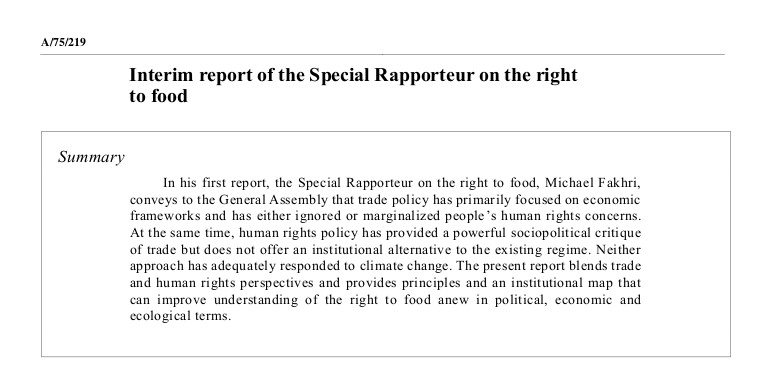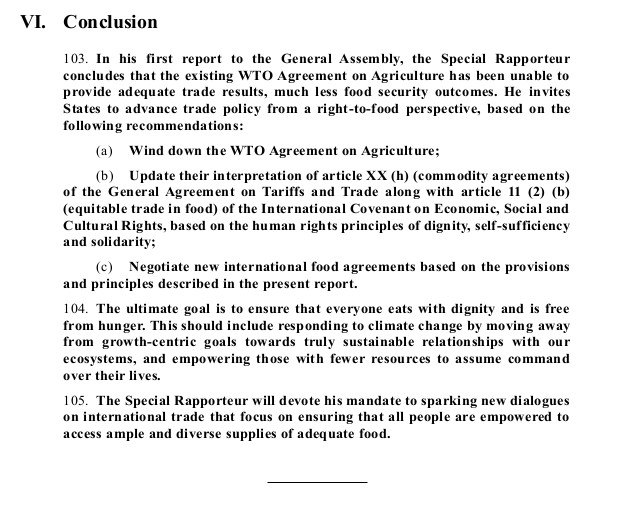After 25 years, the World Trade Organization (WTO), one of the flag bearers of international free trade, is gradually losing its relevance. “Trade policy has primarily focused on economic frameworks and has either ignored or marginalised people’s human rights concerns,” said the Special Rapporteur on the right to food in its latest report: “The right to food in the context of international trade law and policy.
La Via Campesina, who have been fighting against free trade imposed by WTO, welcomes this observation.
The Special Rapporteur on the right to food, Michael Fakhri, started to carry out his tasks and presented the report to the UN General Assembly 75th session this September. It reflects on the longstanding critiques of the WTO’s Agreement on Agriculture and then proposes human rights as one of the overarching principles of better trade practices. The 23-page report is also rich in its references to the right to food, dignity, and solidarity while responding to the current Covid-19 crisis.

La Via Campesina has long been at the forefront of the struggle against agriculture and food liberalisation pushed by the WTO.
“As people working in the field to feed 70% of the world’s population, we were the first to face the brunt of free trade agreements that were pushed forth by WTO and other multilateral institutions. The devastation caused by this top down model of global governance was first felt in our territories when it crashed the prices of our produce, destroyed local peasant markets, wiped away the rich biodiversity that existed in our fields, took away our autonomy over seeds and evicted millions of our sisters and brothers from their territories,” said Kim Jeongyol, a peasant from South Korea.
“The report is very crucial especially for public awareness – it shows that free trade is not working, especially in the current context of pandemic and also in from the eyes of human rights principles,” said Zainal Arifin Fuat, from Serikat Petani Indonesia. “This is why from the beginning we put out our slogan ‘WTO Out of Agriculture’ which then expanded to ‘End WTO’… And we have to stay vigilant as well as the danger is not only with the dying WTO – but also many free trade agreements that already take over in so many parts of the world,” he continued.
La Via Campesina commemorates the global fight against WTO and free trade in its “International Day of Struggle against WTO and Free Trade Agreements (FTAs)”, which is organised every 10 September. This year, the movement organised a web-dialogue “Globalise Solidarity, Localise Agriculture”, which concluded that food sovereignty and the right to adequate food could only emerge from family farming and peasant-agriculture using agroecological means.
“The UN Special Rapporteur reflects this sentiment in his report,” Zainal mentioned. “We are happy that a UN report highlights this important issue, and that our voices and struggles are being heard. “We are pleased with the references to the UN Declaration on the rights of peasants and other people working in rural areas,”

“Now we continue defending and demanding our rights to land, to seeds, to water, to biodiversity, all of which have been hindered by the trade policies pushed by WTO and other FTAs,” added Kim Jeongyol.
One among the first and specific conclusions of the report is to wind down the WTO Agreement on Agriculture. The report is available here (in English, Spanish, French, Arabic, and Russian): https://undocs.org/A/75/219

